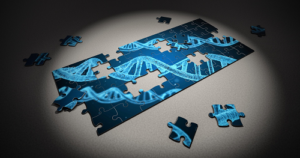Perceived utility of genetic counseling for individuals with eating disorders
Perceived utility of genetic counseling for individuals with eating disorders

Opportunity to participate in research
by Julianne Elizabeth Streukens
Eating disorders are complex in how they are caused, developing from a combination of genetic and environmental factors. However, they are frequently perceived as being under the control of those individuals with them, resulting in public blame, dislike, and anger towards individuals with eating disorders (1). This social stigma and the mentality that eating disorders are a choice (2) are main barriers to social support seeking among individuals with eating disorders (3). Previous studies have indicated benefits associated with including genetics as an explanatory factor affecting the development of eating disorders (1,2). Heritability estimates for eating disorders have ranged from 39-74 per cent depending on the specific eating disorder (4). These estimates indicate a genetic contribution to eating disorder development, bringing them into the range of conditions that fall under the scope of practice of genetic counseling.
Genetic counseling has been defined by the National Society of Genetic Counselors as “the process of helping people understand and adapt to the medical, psychological, and familial implications of the genetic contributions to disease” (5) . Genetic counseling for psychiatric conditions has been shown to help to alleviate stigma and shame by counseling on the interaction of genes and environment in causation, preparing family members to intervene if there is concern about a mental illness potentially developing, promoting help-seeking behaviors among those affected, and facilitating potential earlier recovery as a result of seeking support earlier in the course of illness (6-8). Previous studies have explored interest in genetic counseling of other populations impacted by mental illnesses (8-10), but none so far have looked specifically at attitudes of individuals with eating disorders.
With a research team, I am seeking to assess perception of the underlying cause(s) for eating disorders and potential participants’ interest in genetic counseling and testing that may help determine how to best care for individuals with eating disorders. From this research, we hope to gain a better understanding of what this population of individuals desires, which may help to guide service development in the future.
We are asking individuals age 18-65 who have been personally diagnosed with an eating disorder to complete a survey assessing their demographics and personal opinions and perceptions about eating disorders as well as genetic services. It is anticipated to take 15-35 minutes depending upon depth of open-ended responses.
Participating in the study
Participation in the study is completely voluntary. Those who complete the survey can enter their contact information for a drawing for 1 or 40 Amazon gift cards worth $10.
To access the survey, follow this link:
https://uncg.qualtrics.com/jfe/form/SV_1HylfQxwa8vRjHT
If you have questions, want more information or have suggestions, contact myself, Julianne Streukens, at jestreuk@uncg.edu or Lauren Doyle at ledoyle2@uncg.edu.
Thank you in advance for your time and consideration.
 About Julianne
About Julianne
I am a second-year genetic counseling master’s student at the University of North Carolina in Greensboro. I have always had a deep desire to help individuals by caring well for them and making them feel heard, worthy, valued, and empowered. That is what drew me to the field of genetic counseling, within this profession I have the opportunity to interact with and care for individuals during times in their lives that can be overwhelming, scary, and difficult. I get to come alongside them and walk with them during these hard times, reminding them of their value as well as their capabilities to make the best decision for themselves.
Outside of clinic and my time in the classroom, my favorite way to pass time is spending it with my family and friends. I really do not care what we do, as long as I am with people that I deeply care about and I know reciprocate that care for me. When not with family and friends I really enjoy spending time out in nature, whether going for a hike, sitting in my hammock, or riding my horse. These things keep me grounded, reminding me to slow down and appreciate the beauty that is in the moment.
References
- Crisafulli, M. A., Von Holle, A., & Bulik, C. M. (2008). Attitudes towards anorexia nervosa: The impact of framing on blame and stigma. International Journal of Eating Disorders, 41(4), 333–339. https://doi.org/10.1002/eat.20507
- Easter, M. (2014). Interpreting genetics in the context of eating disorders: evidence of disease, not diversity. Sociology of Health & Illness, 36(6), 840–855. https://doi.org/10.1111/1467-9566.12108
- Akey, J. E., Rintamaki, L. S., & Kane, T. L. (2013). Health Belief Model deterrents of social support seeking among people coping with eating disorders. Journal of Affective Disorders, 145(2), 246–252. https://doi.org/10.1016/j.jad.2012.04.045
- Bulik, C., Yilmaz, Z., & Hardaway, A. (2015). Genetics and epigenetics of eating disorders. Advances in Genomics and Genetics, 131. https://doi.org/10.2147/AGG.S55776
- Resta, R., Biesecker, B. B., Bennett, R. L., Blum, S., Estabrooks Hahn, S., Strecker, M. N., & Williams, J. L. (2006). A New Definition of Genetic Counseling: National Society of Genetic Counselors’ Task Force Report. Journal of Genetic Counseling, 15(2), 77–83. https://doi.org/10.1007/s10897-005-9014-3
- Austin, J. C., & Honer, W. (2004). The potential impact of genetic counseling for mental illness: Potential impact of genetic counseling. Clinical Genetics, 67(2), 134–142. https://doi.org/10.1111/j.1399-0004.2004.00330.x
- Austin, J. C., & Honer, W. G. (2007). The genomic era and serious mental illness: a potential application for psychiatric genetic counseling. Psychiatric Services, 58(2), 254–261.
- Austin, J. C., & Honer, W. G. (2008). Psychiatric genetic counselling for parents of individuals affected with psychotic disorders: a pilot study. Early Intervention in Psychiatry, 2(2), 80–89. https://doi.org/10.1111/j.1751-7893.2008.00062.x
- Andrighetti, H., Semaka, A., Stewart, S. E., Shuman, C., Hayeems, R., & Austin, J. (2016). Obsessive-Compulsive Disorder: The Process of Parental Adaptation and Implications for Genetic Counseling. Journal of Genetic Counseling, 25(5), 912–922. https://doi.org/10.1007/s10897-015-9914-9
- Kalb, F. M., Vincent, V., Herzog, T., & Austin, J. (2017). Genetic Counseling for Alcohol Addiction: Assessing Perceptions and Potential Utility in Individuals with Lived Experience and Their Family Members. Journal of Genetic Counseling, 26(5), 963–970. https://doi.org/10.1007/s10897-017-0075-x





